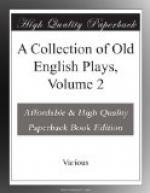Cf. Chapman’s Bussy D’Ambois, I. 1.—
“In tall ships, richly
built and ribd with brasse,
To put a Girdle round about
the world.”
[26] Furnished with “bosses,” which seem to have been the name for some tinkling metal ornaments. Nares quotes from Sp. Moth. Hub. I. 582:—
“The mule all deck’d
in goodly rich array,
With bells and bosses that
full loudly rung.”
[27] Cf. Spanish Tragedy, sc. vi.:—
“A man hanging and tottering
and tottering,
As you know the wind will
wave a man.”
(Quoted by Mr. Fleay in illustration of the “tottering colours” in King John, v. 5, 7.)
[28] One is reminded of Shakespeare’s—
“Had I as many sons
as I have hairs,
I would not wish them
to a fairer death.”—Macbeth,
v. 8.
[29] “That e’er o’erclouded,” I should prefer.
[30] MS. Exit.
[31] Eringoes are often mentioned as a provocative by early writers: Merry Wives, v. 5, &c.
[32] Sc. mallet.
[33] Sc. I lying in my trundle-bed.
[34] To “make ready” is to dress; so to “make unready” is to undress. The expression was very common.
[35] A large salt-cellar was placed in the middle of the table: guests of importance sat “above the salt,” inferior guests below. Abundant illustrations are given in Nares’ Glossary.
[36] In Brand’s Popular Antiquities (Bohn’s Antiq. Libr., II. 70-77) there is an interesting article on “Groaning Cake and Cheese.”
[37] A large coach: the derivation of the word is uncertain.
[38] The next word is illegible in the MS. We should have expected “Exeunt Fer., Man., & attendants.”
[39] Vid. vol. i. 307.
[40] The schoolmen’s term for the confines of hell.
[41] I have followed the punctuation of the MS., though I am tempted to read, “What to doe? pray with me?”
[42] A stage-direction for the next scene.
[43] Sc. bravadoes.
[44] The biting of the thumb is here a mark of vexation: to bite one’s thumb at a person was considered an insult (Rom. and Jul., i. 1).
[45] A diminutive of “cock” (Tempest, ii. 1, &c.).
[46] The conceit is very common. Compare (one of many instances) Dekker’s Match me in London, iv. 1—
“You oft call Parliaments,
and there enact
Lawes good and wholesome,
such as who so breake
Are hung by the purse or necke,
but as the weake
And smaller flyes i’th
Spiders web are tane
When great ones teare the
web, and free remain.”




